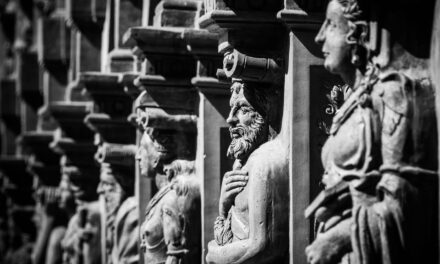The subject of the nature and meaning of the Moral Law, as well as its place for the Christian, has been disputed rigorously over the past few decades. Indeed, only a few years ago, an article, posted on The Gospel Coalition Australia, garnered attention as it looked to relegate the Law as having no place at all in the life of the Christian. However, if we are to take a step back and look at the nature, scope, and intent of the Law from the very beginning, we will see that the Law is not something that can be simply consigned to irrelevancy.
The Existence and Universality of the Moral Law
However, it must be first established that the Law, as presented at Sinai, was given to Israel to mark them out as a special nation, holy unto the LORD (Deut 7:6-7; Exo 19:5). As such, the Israelites were called to live in a way which was in accord with the basis that God required for communion (Lev 19:2, 20:7-8). As it stood, there was a salvational overtone to the Law, because it demonstrated both what sin is, i.e. lawlessness (1 John 3:4), and what was required to find acceptance in God’s eyes, i.e. perfect adherence to God’s requirements in all of life (Deut 30:9-10 c.f. Matt 19:17; Luk 10:25-37; 16:19-31; Gal 5:3). Yet, as we know, Israel was unwilling and unable to do this because sin permeates into the totality of the human condition due to the disobedience (lawlessness?) of our forefather Adam (Gen 3 c.f. Rom 5:12-21). Thus the Law, while truly showing Israel the way to have perfect communion with the Father (therefore in itself holy, righteous, and good) ended up simply being a testament against them, and therefore a ministration of death (Rom 5:20 c.f. Rom 7:7-12). However, and importantly, it was much more than just Israel who were condemned for transgression. As we know, all mankind stands condemned due to sin, per Romans 3:9-19. But how can non-Israelites be accountable for sin when they do not have the Mosaic Law? How can they be seen as being transgressors?
This is because the Moral component of the Law is transcovenantal. It pre-existed the Covenant made at Sinai, as is most obviously seen in the principle of the Sabbath (Gen 2:2-3 c.f. Exo 20:8; Deut 5:12) but is also clearly indicated through the very existence of moral judgements made prior to Moses. Murder and jealousy are condemned in Genesis 4, the deeds of Sodom are called out as being lawless and sinful (Gen 13:13 c.f. 2 Pet 2:7-8). Indeed, it can be convincingly argued that the Moral Law was made known even to Adam and Eve. Such an understanding of the pre-existence of the Moral Law is also asserted within Chapter 19 of the 1689 and Westminster Confessions. The Moral Law was written on the hearts of humanity (Rom 2:14-15), whose consciences convict them of their sin because all men know this Law of God, and ultimately, the Lawgiver, but suppress as much as possible due to rebellion (Rom 1:18).
Whilst I can personally see a tripartite division1Being Ceremonial, Judicial, and Moral. of the Law, I think it’s important to acknowledge that Scripture recognises the existence of at least two categories of Law: that which was only for Israel – the ceremonial and judicial laws which were tied to the theocracy – and that which transcends beyond, both in terms of space and time, Israel – the latter having traditionally been termed the Moral Law. The traditional Reformed understanding of the Moral Law being that it articulates God’s expectations of what it means to live rightly before him, in a way that best expresses our nature as human beings created in his image. Keeping the Moral Law therefore honours God, and is good for us and each other – it shows how to love God and neighbour. As per the Decalogue, whereby “the first four commandments [contain] our duty towards God; and the other six, our duty to man” (WCF 19:2). The fact that God rebukes gentile nations for sin, as he does in the writings of the Prophets, is demonstrative that this Moral Law is not unique to Israel.
Thus, the entirety of humanity was (and is) condemned under the Law. Since Adam’s disobedience, this Law has not been a joy but a burden that cannot be lifted by man’s own strength, which is why Christ was so desperately needed. Christ being without sin, was obedient to the Law perfectly, ensuring that the prerequisite to unfettered communion with God was fulfilled (Gal 4:4-5 c.f. Matt 5:17), unlike that of Adam. This, of course, being in addition to Christ a perfect sacrifice and atonement in which He purchased, and substituted for, the Elect. Therefore, now that Christ has ‘fulfilled’ the law, and acts as substitute for us, through the process of ‘Double Imputation’, what then remains for the Moral Law? Paul goes to great lengths to remind us that those who are in Christ are no longer under the ‘condemnation’ of the law (Rom 8:1 c.f. Rom 6, 7; Gal 3). It no longer acts as a ministration of death. Yet, despite this shift, the Moral Law still functions. It continues to convict and bring men, outside of Christ, under condemnation. Through convicting individuals, it restrains further evil, but lastly, it acts as guide for those who are in Christ.
The Moral Law and the Christian
When Christ states in Matthew 5:17 that, “I have not come to abolish them [the Law or the Prophets] but to fulfil them”, he was saying that he did not come to ‘remove’ or ‘abrogate’ the Moral Law, something that is transcovenantal, but to ‘fulfil’ it through his perfect obedience. Thus, the law continues in its functions. Similar to when one fufills the prerequisites of joining onto a soccer team, or other things you undertake, the prerequisites remain for other people. This fits into my understanding of succeeding verse, 18, where he states: “For truly I tell you, until heaven and earth disappear, not the smallest letter, not the least stroke of a pen, will by any means disappear from the Law until everything is accomplished.” Whilst some may see it meaning that it is over as part of the whole now/not-yet paradigm, the Reformed tradition has traditionally held it to mean when Christ comes back and the new creation is fully culminated.
This fits within an understanding of what Paul is getting at in Romans and Galatians. Since we are now free from both the burden of having to obey the Law to be justified, and its condemnation for disobeying it, Christians, in response, follow the Law obediently in delight of the fact that it reflects the character and holiness of God. Thus, the Law hasn’t changed in substance, only in consequence, and, specifically, in how a Christian relates to the Law. It is no longer something that people attempt to strive to follow in an effort to merit salvation, as was the situation that Paul was addressing in Galatians 3. Instead, as we know, we are saved by grace through faith, and this is a gift from God (Eph 2:8). So, the outlook towards the Law changes for a Christian. This is why Paul is very careful to push back against antinomianism, or a hyper-grace understanding, i.e. that because we’re under Christ and no longer under the yoke of the Law, that we are free to do as we please. Indeed, in Romans 6:15, Paul poses the question “Shall we sin because we are not under the law but under grace?”. This being understood in the light of sin being lawlessness as stated in 1 John 3:4, means the question becomes effectively ‘Do, or can, we break the law now that we are no longer underneath the law but under grace?’ to which Paul answers, “By no means!”
Paul carries this distinction of ‘obeying the Law whilst in Christ’ as opposed to ‘obeying the Law whilst under the Law’ in other places as well. In Romans 3:31 he states: “Do we then make void the Law through faith? Certainly not! On the contrary, we establish the Law.” Likewise, in 1 Corinthians 9:21, when speaking about his evangelistic model, he states “To those not having the law I became like one not having the law (though I am not free from God’s law but am under Christ’s law), so as to win those not having the law.” However, Romans 7:14-25 sets this idea up in, perhaps, the clearest way. I believe that this is Paul depicting the inward struggle of a Christian, having been given a new heart, but still constrained by the sinful flesh. Paul speaks about how he delights and desires to be a slave, or obedient, to God’s Law, but struggles against sin still in his life.
So the Law plays a role in the Christian life. But it’s a different kind of obedience. It’s not a burdensome obedience compelled by a need to be right with God. It’s a loving, joyful obedience, born out of delight in already being right with God through entrusting ourselves to Christ. Christ himself said “If you love me, keep my commands” (John 14:15). This needs to be seen from the sense that not only did he rearticulate, or summarise, the Decalogue, but that Christ is God, the eternal Logos, in which and by which God’s revelation has always been made known. So Christ is affirming the adherence to the Moral Law, but asking that such adherence be driven by love.
And there is an obligation for Christians to adhere to the Moral Law. How can we obey Christ without adhering to it? How can we conform to be more like Christ, as we are told to do, without the guidance of the Moral Law, when He, himself, upheld it? How can we be a living sacrifice, or a slave for Christ, when we are unsure of what that actually means? How can we, as Paul states, please God? We can only do all these things through the way He has revealed to us, which is through the upholding of what He has given. For the Moral Law truly reveals what pleases God. It reflects and reveals the nature of the Law-giver and, subsequently, the Law “is holy, and the commandment is holy, righteous and good” (Rom 7:12), because God is holy, righteous and good. (This, I believe, best accounts for the meaning of John 14:15.)
Therefore, by living a life that has been redeemed by Christ, and is being conformed to Christ, we ought “to present [our] bodies [as] a living and holy sacrifice, acceptable to God” (Rom 12:1), which means living in a way which is in accordance to that which God has decreed from time near-eternal. This is what sanctifying obedience requires – to follow the Master, God, the way He has revealed to us, which is to now live by righteousness, which is reflected through the law (Rm 6:16; Eph 5:8, 6:14; Phil 1:9 c.f. Rm 10:5). Not because it will save us, for we have been saved through Christ’s righteousness, but because we desire to please the Father.
This entails us not pitting Christ against the Law, or the Gospel and Law as antithetical. To do so is a false dichotomy. Instead, Christ has purchased us at a price, and now we seek to honour and love both Him and the Father who sent Him, and we do this in a way which is in accordance to the way He has revealed. After all, Christ perfected what obedience to the Father looked like. But how was he obedient? By ‘fufilling’ the Moral Law. So if we wanted to follow Christ’s model, the Moral Law plays a part. Providing an overarching framework clearly derived from the dynamics of the Bible itself. It provides a way to see the consistency of God’s moral requirements from Moses to the Prophets to Christ and his Apostles, while simultaneously affirming that all these requirements are properly fulfilled in and by Christ, and Him alone. By the removal of the Moral Law from this Biblical foundation, Christians run the risk of reducing Christ’s ideas to nothing more than abstract principles.
- 1Being Ceremonial, Judicial, and Moral.





